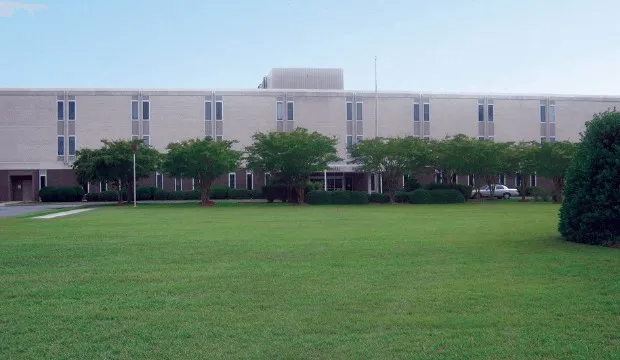August 12, 2024. It has been little over a year since Martin County, a rural community of 22,000 in eastern North Carolina, lost its hospital.
Martin General served generations of local families during its seven-decade run in Williamston, the county’s seat of government. People born at the hospital returned to witness the births of their own children and grandchildren. Some lifelong residents drew their first — and last — breaths at the 43-bed facility.
But as the county’s population began to dwindle in the 1990s, so did the for-profit hospital’s revenues. Teetering on the brink of bankruptcy, Martin General attempted to cut costs by discontinuing maternity services in 2019 and shuttering its intensive care unit in 2021.
The changes weren’t enough to keep the struggling hospital afloat. In August 2023, Martin General announced it would close after 73 years in business.
“Though this is a very emotional decision, Martin General Hospital is no longer accepting patients, including emergency patients, and the hospital has filed for bankruptcy,” Quorum Health, the hospital’s owner, said in a statement at the time, adding that Martin County’s Board of Commissioners “chose not to respond” to a proposal that would have transferred ownership of the facility to the county.
In a Facebook post disputing the company’s version of events, the county wrote that commissioners had met to discuss the terms of the transfer and instructed their attorney to “ask for additional information” on Aug. 1. The county said it learned the next day that Quorum had “closed the doors of Martin General.”
Citizens of Martin County, where the median household income is only $44,799 a year ($21,387 less than the statewide average), responded to the closure with concern and outrage. Losing Martin General meant they would be forced to travel more than 20 miles to the nearest emergency department in neighboring Beaufort County. They wondered how their elected leaders could allow this to happen.
“Do you really care, commissioners?” Verna Perry, a longtime Williamston resident, asked during the board’s meeting in April. “If you cared, you would do something to get us a hospital here.”
But the county had been working for several months on a complex plan to resurrect Martin General — a plan that, if successful, could become a blueprint for other rural communities where hospitals have closed.
Uncharted territory
When Congress passed the Consolidated Appropriations Act of 2021, it created a lifeline for struggling hospitals in rural areas, allowing small facilities with less than 50 beds to convert to so-called “rural emergency hospitals.”
In exchange, the hospitals would receive millions in annual funding from the federal government. They would also be eligible for increased reimbursement rates for some outpatient services covered by Medicare.
The catch? While rural emergency hospitals are required to provide 24/7 emergency care, they are not allowed to offer inpatient services.
These inpatient services, which range from elective surgeries to childbirth, tend to make up a large share of traditional hospitals’ revenue. A 2018 study by the American Hospital Association found that inpatient services accounted for more than half of all revenues reported by community hospitals from 1995 to 2016.
But it’s a trade-off that some hospitals appear willing to make. Twenty-nine facilities across the U.S. have converted to rural emergency hospitals since the program launched in January 2023, according to data from the Cecil G. Sheps Center for Health Services Research at the University of North Carolina.
Unlike Martin General, those hospitals were still in business when they made the switch. Officials in Martin County, however, believe the hospital can be reopened using the rural emergency model — something that has not been attempted anywhere else in the nation.
“As far as we can tell, this is really the first such situation in the country,” Ben Eisner, interim Martin County manager, said in an interview with NC Health News. “Trying to navigate that has certainly been tricky. It’s taken us a number of months to work through some of the regulatory issues of opening a closed hospital as a rural emergency hospital.”
The hospital will benefit from a 2015 law passed by the General Assembly that makes it easier for a shuttered hospital to get back into business if the reopening takes place within a two-year window after the initial closure.
Dawn Carter, health care consultant for Martin County, said a study conducted by her firm in early 2023 found that the rural emergency hospital program would “be a really good fit” for Martin General, whose financial difficulties were by then well known.
The problem, she said, was that the North Carolina General Assembly had yet to adopt a state budget with language allowing the state’s hospitals to participate in the program. Quorum closed Martin General in 2023 before a budget finally passed — months behind schedule — that October.
“We were thinking about it before the hospital closed, so we just continued to pursue that option,” Carter said in a video interview. “It being closed raised a lot more questions. But unless the feds told us, ‘No, you can’t do this,’ we were going to continue to pursue it.”

Earlier this year, the Centers for Medicare and Medicaid Services confirmed that Martin General could reopen as a rural emergency hospital, clearing the first and arguably most important hurdle in the county’s path. But Carter said there are still obstacles left to overcome.
The aging facility, which Eisner described as having been “cobbled together over the years,” must pass an inspection to ensure it meets CMS’ requirements for the program. After that happens, the county will need to solicit proposals from providers who are interested in running the hospital.
Eisner said the timeline for completing those steps is uncertain. He and Carter declined to share their predictions for when Martin General might actually reopen.
“I don’t want to give false hope to that community, so we’re telling them what we know when we know it,” Carter said. “And right now, it’s just not determined.”
Closure’s impacts
Perhaps the biggest consequence of Martin General’s closure has been the loss of the hospital’s emergency department, which averaged about 16,000 visits a year.
Residents in need of emergency services must now be transported to hospitals in neighboring counties. Eisner said the longer drives have put increased strain on Martin County’ s small staff of paramedics and ambulance drivers.
“Certainly, if you’ve watched any of our board meetings over the last several months, there’s been a lot of citizen unrest and concern about what happens in the future,” he said. “But I think it’s been kind of documented that the greatest impact has been on EMS and local emergency services, which are seeing increased distances, wait times and costs.”
Calls for emergency services have also been on the rise, according to Carter.
“Because of transportation challenges in Martin County, it’s hard enough to get a ride 10 minutes down the road to the hospital,” she said. “But if you’ve got to go 30 minutes, you’re going to call EMS — whether you really need that care in transit or not.”

Underscoring the need for a local emergency department is this year’s County Health Rankings report from the University of Wisconsin Population Health Institute , which rated Martin among the least healthy counties in North Carolina.
Martin County has higher rates of adult obesity, adult smoking, sexually transmitted infections and premature deaths than the state and nation, according to the report. The life expectancy for county residents is about 72 years — four years less than the statewide average.
Breaking ground
Martin County is far from the only rural community that has lost its local hospital in recent years.
According to the Sheps Center, nearly 150 rural hospitals across the U.S. have either closed or drastically scaled back their services since 2010. Twelve of those facilities are in North Carolina, the center reported.
In addition to being the first hospital in the nation to reopen as a rural emergency hospital, Martin General would be the first hospital in the state to receive the designation. Because the program is not open to facilities that closed before 2023, it cannot be used to bring back the state’s other shuttered hospitals.
But Martin County’s experience could provide a road map for other rural communities facing a similar situation in the future.
“If the dynamics are consistent with what the community needs and wants, then I think that this is certainly a viable option for them to consider in order to maintain access to high-quality outpatient care that is vital to a rural area,” Brock Slabach, chief operations officer for the National Rural Health Association, said in a phone interview. “When we look at surveys of individuals in rural communities and what they value about their health care system, emergency services tend to be at the top of the list.”
Slabach said the rural emergency program was “never designed to be an answer for all the problems of rural health.” The program can, however, be a “valuable tool in the toolbox for communities to consider to maintain and hopefully revitalize their health care services.”
“I applaud this county for taking a look at this program and having people interested in reopening a closed facility to restore that access to care that is so vitally needed,” he said.
Still, Slabach acknowledged that the provider that eventually takes over the hospital will have their work cut out for them.
“It’s not easy to run any facility, let alone reopen one that’s been closed, because you’ve got to create everything from scratch,” he said. “It takes time to gather a team with the expertise to be able to navigate the reopening of a facility, never mind one that is opening as a new provider type like a rural emergency hospital.
“This could be a journey, and it will definitely take some effort on their part to get that done.”
####
By Jaymie Baxley, North Carolina Health News
Rural NC county pursues experimental plan to revive shuttered hospital: Martin County could become the first community in the nation to bring a closed facility back to life using a new federal program originally posted on https://www.northcarolinahealthnews.org/2024/08/12/plan-to-reopen-martin-general/
North Carolina Health News is an independent, non-partisan, not-for-profit, statewide news organization dedicated to covering all things health care in North Carolina. Visit NCHN at northcarolinahealthnews.org.


